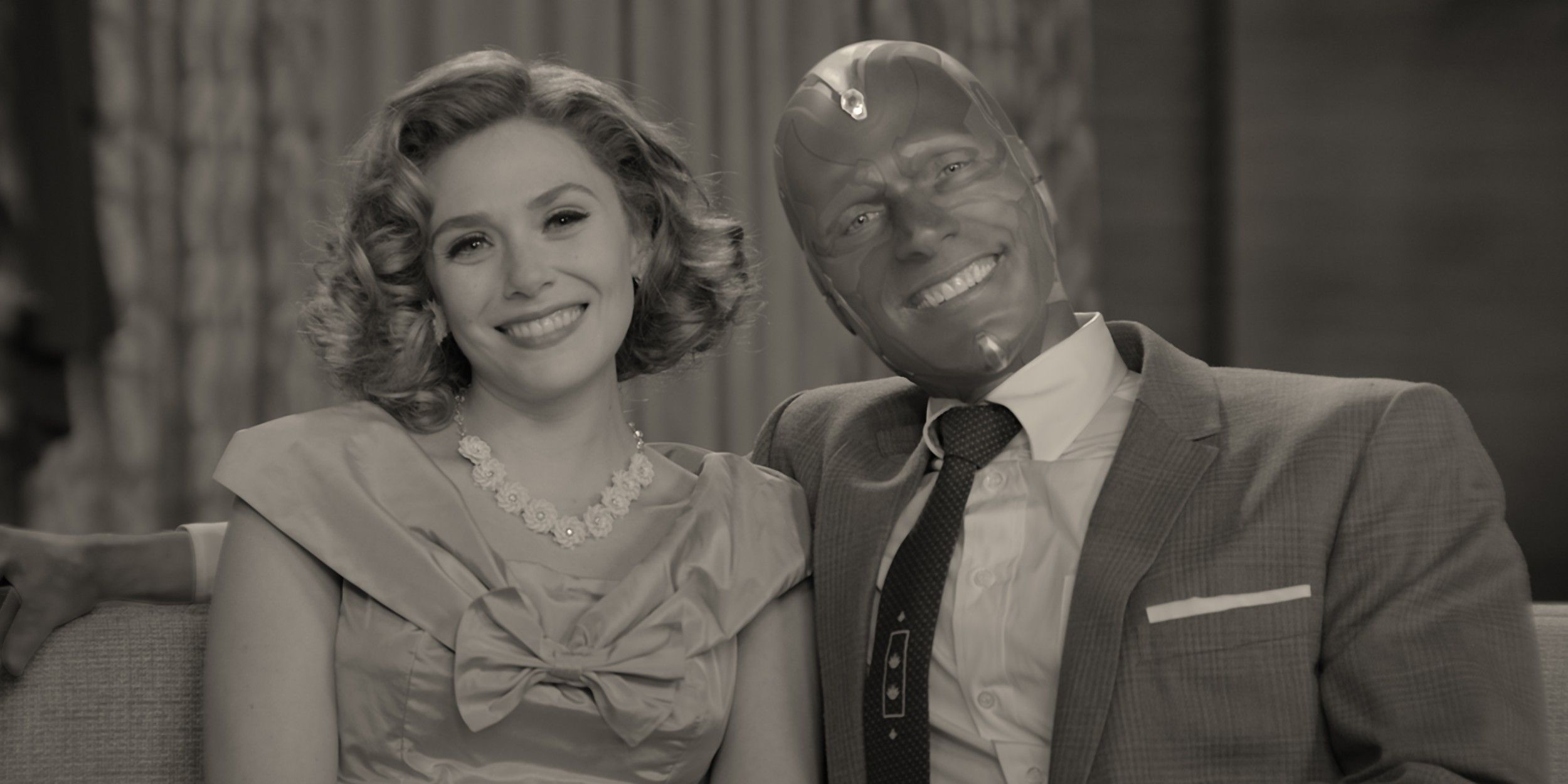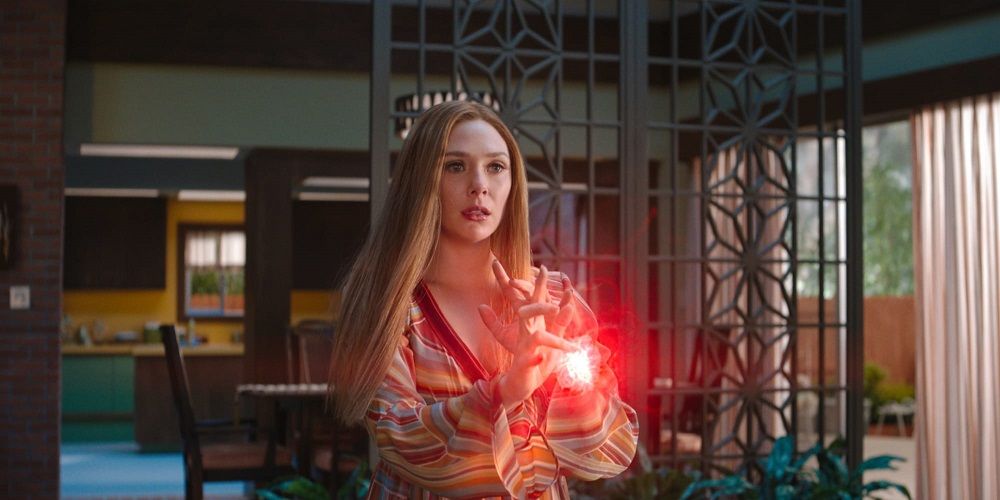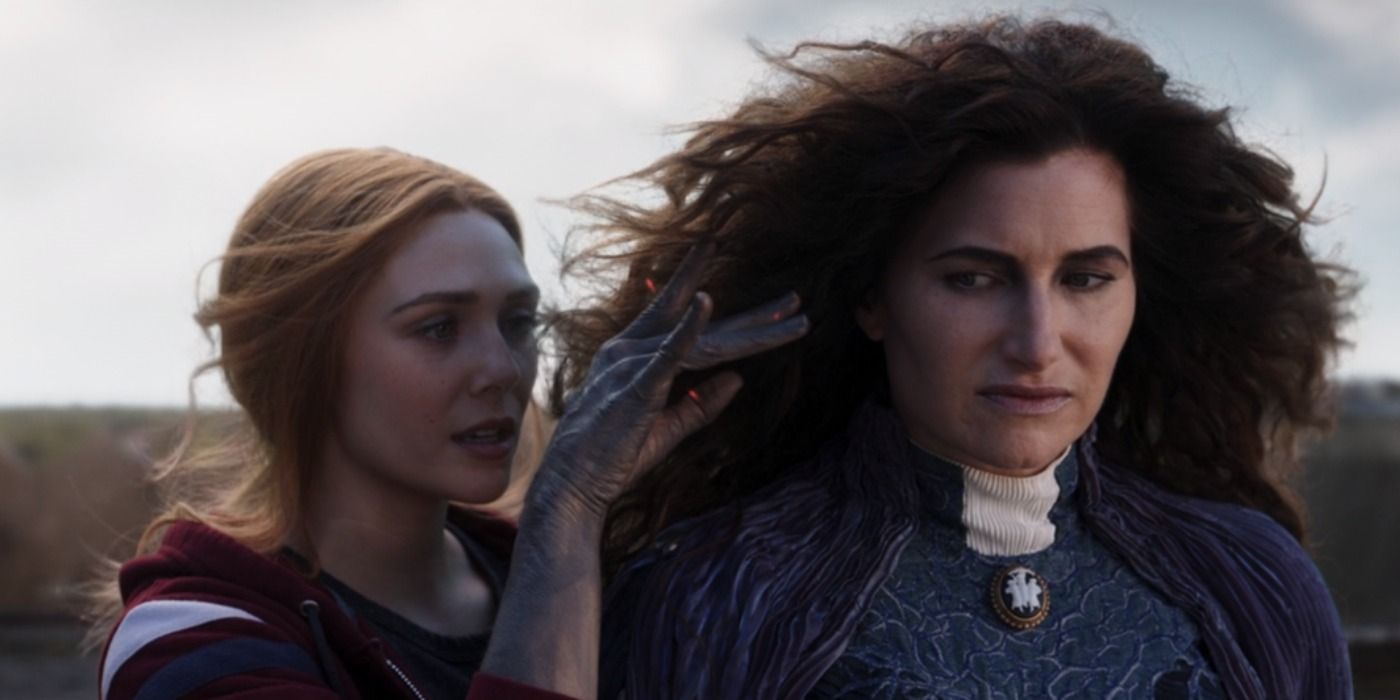
WandaVision, Marvel's flagship Disney+ show, recently dropped the finale of what is its first, but hopefully not last season. The series was a creative departure from Marvel's usual action-heavy fare, being a season-long exploration of one woman's grief in the trappings of classic sitcoms within a larger Marvel universe. What does the future hold for the show and for Marvel series in general?
Co-executive producer Mary Livanos spoke with Screen Rant about bringing the wildest of ideas to life, what it's like working with Kevin Feige, and the magic that Elizabeth Olsen and Paul Bettany brought to the screen every week.
Marvel is obviously at the point where they can afford to experiment a little bit creatively because the brand is solid. But WandaVision was even more out there than many anticipated. Was there any hesitation when it was first pitched? What was the initial reaction?
Mary Livanos: I think just explaining it to folks at the very beginning, there was an eyebrow raise that came along with it. But what has been fantastic is that Kevin Feige has always understood it.
Being assigned the project, it was just so incredible to go back and watch sitcoms; suburban family sitcoms that I myself, as a younger viewer, had never gotten around to seeing before. Never having done TV before but being a TV fan, it was so cool to go back and watch and understand what makes these shows so honestly timeless.
That in conjunction with being a comic fan and going back, knowing that Wanda and Vision and these other characters were coming up next, and reading all their comics. Brainstorming and doing that research simultaneously was really interesting.
You mentioned that Kevin Feige had always been a champion of this show. That seems to be a real gift of his: seeing the whole playing field when others might not. What's it like working with him to develop a concept like this?
Mary Livanos: It's incredible working at Marvel and with Kevin and Lou [D'Esposito] and Victoria [Alonso, Marvel's other two longtime producers]. The culture really comes from the top down, and they're incredible, carrying examples of what we all strive to be. Kevin and everyone, they're incredibly empathetic individuals who care most about character first. And they are just these huge fans, so everything that is created is created from this really lovely, honest place.
I think that's what you see in WandaVision, and that was always the design for it. It was about the love of television, celebrating that, and it's incredible to see that now out in the world as well.
Speaking of that empathy, the comics haven't always treated Wanda well. She's always ended up being the monster, very unstable or very fragile. Even the comic book arc this is based on, House of M, was not great for her. How much did it mean to you and to the rest of the team to rehabilitate her image a little bit and give her more agency?
Mary Livanos: Having not worked with Wanda the character before - beyond the writers - we came to the project really appreciating who she had been in the MCU thus far. And then reading and absorbing and understanding the comics, we wanted to take the story of someone who has been going through a lot and who has endured grief, and tell a story about emotional processing.
The writers' room just did an incredible job doing that with such care. I think that's what you see now in the show. But for us, it was being inspired by the comics, but using what we had in the MCU thus far to propel Wanda into this new level and identity as the Scarlet Witch.

We haven't really gotten to see Wanda and Vision's relationship that much in the MCU to date, but it was magical seeing Elizabeth Olsen's and Paul Bettany's work on screen. Was there ever a moment that you were watching them and were blown away by the chemistry they had together?
Mary Livanos: Paul and Lizzie are incredible together. They're such talents, and they were asked to do in the series. To see them nail 50s, 60s, 70s, 80s - all these amalgamations of you sitcom television - plus evolving their MCU characters and using one to inform the other, that was an incredible thing to watch. Their relationship was just so wonderful and honest.
I think they've been able to illustrate a great love story that resonates with a lot of people, and that's something that we haven't done a ton of in the MCU. Which has just been skillfully and beautifully done by Lizzie and Paul here.
Because this is so experimental and so different, has the success of this made Marvel more open now to doing more projects like WandaVision? Do they have plans for projects that are a little bit more intimate and character-focused or experimental rather than the big action pieces?
Mary Livanos: For sure. What Marvel strives to do is let character drive everything. So much of what's beautiful about WandaVision is that's what we've done here. And the added bonus of the format being experimental is encouraging to us as huge fans and nerds ourselves. It's the idea that what audiences enjoy now is things that break out of the box. It's really fun to be able to take the ball in places that you wouldn't have otherwise expected.
WandaVision was never originally supposed to go first and be the first Marvel show on Disney+. Did you have to retroactively change any of your story or adjust anything because you were going first?
Mary Livanos: To know that we were coming out as the first Marvel Studios Disney+ show, we actually didn't change anything. We just kept on making the show that we were making, and none of the story that we were trying to tell hinged into the larger timeframe in a way that made us change anything else. We've just in making the show we've been set out to make from the very beginning, which is pretty great.

Adjacent to that question, COVID changed so much. So many shows had to completely change the trajectory of planned stories due to safety protocols or filming restrictions or scheduling conflicts. Did you have to change anything for that reason? I know Kat Dennings couldn't be in the finale as much as originally planned, for example.
Mary Livanos: The fact that we were faced with COVID, and that we had to shoot the LA portion of our work during COVID, actually didn't change all that much from what we originally set out to do. We had to end up changing the location of the [episode] 1x02 womens' club to the outdoor, cool setting, which is actually already attached to Blondie Street. It's a famous lot here in LA, where all the classic sitcoms were shot, like Bewitched and The Donna Reed Show.
It was fun to find a creative solution to that, and I think the look of it - Mark Worthington design such a lovely, cute club of the time - ended up actually giving us a nice, deeper view into Westview than we otherwise would have.
You worked with Destin Daniel Cretton on Short Term 12, and now he's part of the Marvel Universe. What does he bring to the table for Shang-Chi, and what do you expect from having familiarity with him as a director?
Mary Livanos: Well, I was a PA on Short Term 12. I took out the garbage - like, literally [laughs], so I can't say I was all that close to Destin or Brie at the time. But I remember it being a very lovely set. I know Brie, and I have met Destin, but they're such lovely people. Also, what a small world.
There was a little bit of backlash about certain fan expectations or theories that weren't paid off. Most of that was just fans reading into things that were not there, but there were other things like Evan Peters showing up as Quicksilver and then it going the other way. Can you understand why there's some of that reaction from fans? And in a broader context, does it make you happy to see your show generating that conversation?
Mary Livanos: I can't claim to understand all of the fan reaction, but to see the conversations flourish in that way was really cool and fun. The writers' room remains very active as a text group, and everyone's just having so much fun absorbing all that reaction. Everyone was, so that was really special to see happen.
But what's really great, and what we hope, is that people seem emotionally satisfied and understanding of where our journey ended up. That's been lovely.
from ScreenRant - Feed https://ift.tt/2OgLdV2

0 Comments